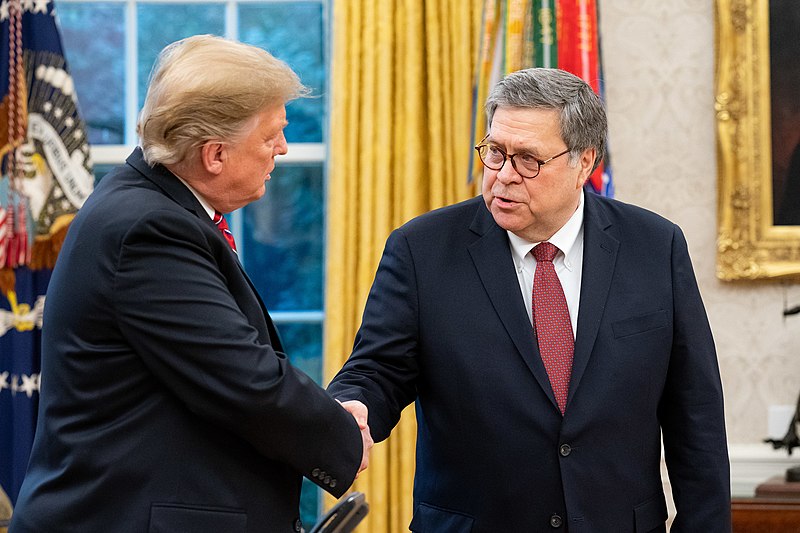Opinion | Justice Department invokes no justice
Photo Courtesy of The United States Department of Justice
President Donald Trump and Attorney General William Barr shake hands. Columnist Andrew argues the Department of Justice does not prioritize justice as it should.
Oct 22, 2019
When the founders created the judicial branch, they made it a separate, independent branch from the other two branches so that it would not be saturated by politics. The Department of Justice was founded on the same principle. It was intended as an executive tool to enforce the law, represent the U.S. government in litigation and to act in the interest of the American people.
Unfortunately, President Trump has grossly misused the DOJ and conflated his personal interest with the interest of the American people. He has weaponized the department, which is meant to be impartial to politics, to do his personal bidding, which has become overtly clear over the tenure of this administration.
The first hint at how a Trump DOJ would be operated was when the White House abruptly expelled 46 Obama-appointed lawyers from the department with a lack of strong reasoning for the purge. This set the tone for how Trump would inflict his ordinances upon the department for the remainder of his presidency.
The president’s frustration with DOJ objectivity was further evidenced by former Attorney General Jeff Sessions, recusing himself from the Mueller Investigation.
The president openly admitted he would not have chosen Jeff Sessions for the position had he known Sessions would recuse himself. While Attorney General Sessions did his best to keep the probe impartial, the president became angry that his cabinet secretary would lack the power to scrutinize it at his own will.
Get The Daily Illini in your inbox!
The moment when the president brazenly demonstrated that the DOJ was, in his eyes, his political tool to be exploited was when the DOJ decided to prosecute two Republican congressmen indicted of federal crimes, and the president was furious.
The department charged Representatives Chris Collins and Duncan Hunter with financial crimes, to which the president criticized Sessions and blamed him for the bad publicity it would bring the party before the midterms.
In this tweet, the president proclaims the DOJ should ignore, at least until after the elections, crimes perpetrated by party members to optimize political gain. He is effectively saying, “it reflects badly on the party when you prosecute members of the party for their crimes” rather than “it reflects badly on the party when you break the law.”
Once Sessions was fired by President Trump, after Matthew Whitaker’s interim period as Acting AG, William Barr was appointed to assume the position. Despite his controversial record, Barr was confirmed.
Attorney General Barr has not attempted to maintain the same evenhandedness Sessions once did. The DOJ under Barr has largely been an institution acting as a slate of lawyers attempting to deflect bad press from the president and wasting resources investigating the president’s conspiracy theories.
The first test of the Barr DOJ was the Mueller Report, in which well-respected Robert Mueller, a reserved and calculated man, penned a letter to Barr complaining his “summary” of the report mischaracterized the report’s contents. Barr additionally concluded rather quickly that there was no obstruction of justice, a discussion left open-ended in the report. The complete mishandling of this report further politicized the department.
As the impeachment inquiry has transpired, reporting, along with the whistleblower complaint, has alleged Barr’s involvement. It alleges that AG Barr and Trump’s personal attorney, Rudy Giuliani, were meant to cooperate with Ukraine on an investigation into Trump’s main political rival, former Vice President Joe Biden.
Further reporting indicates Barr has attempted to coerce multiple world leaders to aid investigations into political rivals and institutions at the center of the president’s conspiracy theories, such as the intelligence agencies.
During the congressional hearings over the Mueller investigation as well as the impeachment inquiry, the DOJ has fiercely resisted cooperation with Congress. It has blocked countless relevant testimonies and withheld innumerable documents from congressional committees, defying subpoenas.
Just this past week, the DOJ asked to block Mueller investigation materials from being turned over to the House while arguing that historical precedent for this, during the Nixon Watergate investigation, was wrong.
The DOJ congenitally has a political bent, as it is a part of the executive branch and can set an agenda, but it is still meant to represent the people in an objective manner, not the president.
Attorney General Barr is the lap-dog the president has been looking for. The administration has transformed the respected legal institution into a political pawn to be employed at the president’s prerogative.
If the department wishes to reclaim an iota of independence it once had as well as preserve any shred of its credibility, it has a long road ahead to rectify its severe disgrace.
Andrew is a sophomore in LAS.






